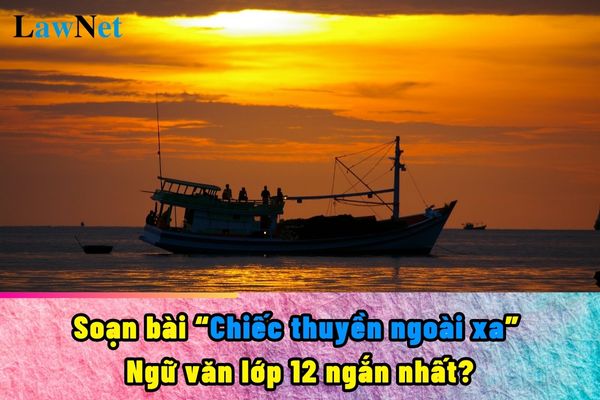Guidelines on preparing the lesson Chiếc thuyền ngoài xa for grade 12 students in Vietnam
Guidelines on preparing the lesson Chiếc thuyền ngoài xa for grade 12 students in Vietnam
"Chiếc thuyền ngoài xa" is a type of short story that grade 12 students will study in their grade 12 Literature curriculum.
Teachers, parents, and students can refer to the following guidelines on preparing the lesson Chiếc thuyền ngoài xa for grade 12 students in Vietnam:
|
Guidelines on preparing the lesson Chiếc thuyền ngoài xa for grade 12 students in Vietnam * Main content of the text: The short story "Chiếc thuyền ngoài xa" revolves around the life of a poor fishing family and a photographer who goes to the sea to find creative inspiration. Through this, the author explores profound societal conflicts, issues of ethics, human dignity, and beauty. The work raises questions about artistic beauty, the beauty of life, and the relationship between artists and real life. * Significance of the text and how to divide sections for reading: |
*Note: This information is for reference purposes only./.

Guidelines on preparing the lesson Chiếc thuyền ngoài xa for grade 12 students in Vietnam (Image from the Internet)
What are contents of grade 12 Literature in Vietnam?
Based on Subsection 2, Section 5, General Education Program for Literature subject issued together with Circular 32/2018/TT-BGDDT, grade 12 students study the following content in Literature:
*VIETNAMESE LANGUAGE KNOWLEDGE
- Preservation and development of the Vietnamese language
- Logical errors, ambiguous sentences, and ways to correct them
- Rhetorical devices such as sarcasm, oxymoron: characteristics and effects
- Text types and genres
+ Persuasive texts: the role of arguments, reasoning, and evidence; the purpose, emotions, and viewpoints of the writer; methods to increase affirmation and negation in persuasive texts;
Argumentation methods and expressive language; speeches in the launch of a movement or social activity; essays on a topic related to youth; comparative and evaluative essays on two literary works of the same or different genres
+ Informational texts: the value of the topic, key information of the text; types of data and the reliability of the data; job exchange letters; reports on project exercises or research results on a natural or social issue
- Respect and protection of intellectual property rights in academic and research activities
- Basic characteristics of formal and informal language: understanding and application
- Non-verbal communication means: images, data, charts, diagrams,...
*LITERARY KNOWLEDGE
- Cognitive, educational, and aesthetic functions of literature
- The suitability of theme, ideology, and main inspiration
- Some expressions of artistic style in folklore, medieval literature, modern literature, realistic and romantic tendencies; the artistic style of authors
- Some elements of legendary stories, modern and postmodern novels, modern lyric poetry, comedy, memoir
+ Legendary stories: topics, characters, language, artistic methods; evaluate the role of fantasy elements in legendary stories, relate to the role of these elements in folklore
+ Novels (modern and postmodern): language, psychological developments, actions of characters
+ Modern lyric poetry: language, images, symbols, elements of symbolism, surrealism
+ Comedy: language, characters, situations, satirical methods
+ Reportage, diaries, or memoirs: non-fiction nature, description, narration; the combination of realistic details and events with the writer's experiences, attitudes, and evaluations
- Psychological developments of characters and the author's ways of expressing them
- The relationship between the narrator and the point of view in expressing the theme of the text
- Basic understanding of Ho Chi Minh to aid in the comprehension of some of his representative works
- An overview of the history of literature and the role of foundational knowledge about the history of literature in understanding texts.
What are types of materials used for grade 12 Literature in Vietnam?
According to the regulations in Subsection 2, Section 5, General Education Program for Literature subject issued together with Circular 32/2018/TT-BGDDT, the materials used for grade 12 Literature include the following texts:
(1) Literary texts
- Legendary stories, short stories, and modern novels
- Modern lyric poetry
- Comedy
- Reportage, diaries, or memoirs
(2) Persuasive texts
- Social argumentation
- Literary argumentation
(3) Informational texts
- Explanatory texts with one or more elements such as description, narration, expression, argumentation
- Research reports, job exchange letters.

